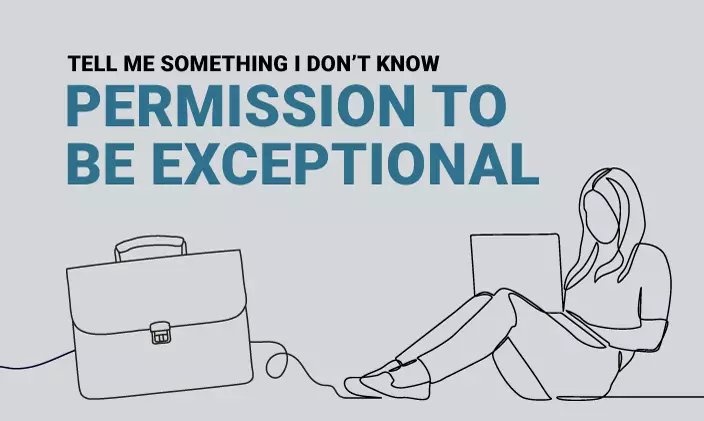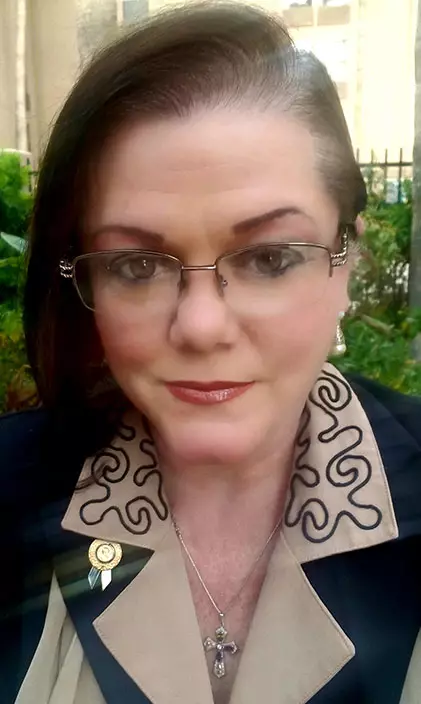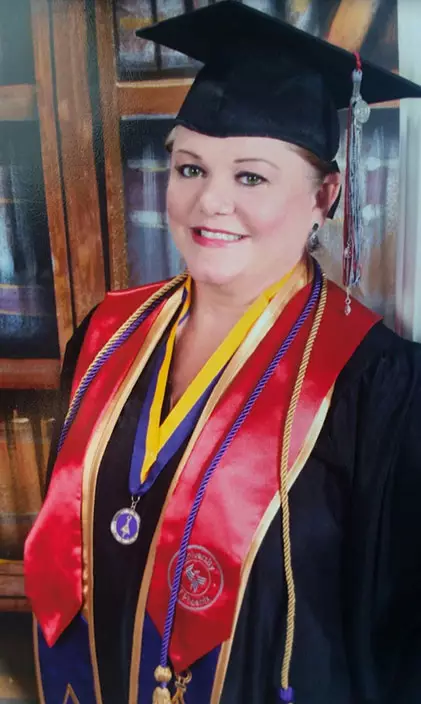Discover more stories in our Alumni Chronicles Magazine!
Permission to be exceptional: How Tracylyn Sharrit found success through education

By Laurie Davies
Raised in and out of foster care and with three young children by the time she was 21, Tracylyn Sharrit (BSBA, 2016) always assumed college wasn’t in the cards.
In those early years of parenting, life was more about putting one foot in front of the other than it was about dreaming of college and career. She had a job as a medical assistant, which led to an office manager position.
But a cascade of health issues, including multiple sclerosis and idiopathic erythema multiforme — a rare and painful condition that results in lesions on the body — sidelined Sharrit.
“I stayed home, took care of the kids, and was on disability for about 10 years,” she says.
Stepping into her future
In 2004, she was ready to reenter the workforce. “When my kids were in high school, I wanted to be an example,” she says.
After a season at AmeriCorps, where she got to help disabled clients like herself get placed into jobs, she joined a nonprofit called Feeding America, the nation’s largest domestic hunger relief organization. Right out of the gate, her interview hinted at an educational path that was to come later. Sharrit recalls asking her interviewer, “How many people interviewing for this job have a degree?”
“Everyone but you,” he said.
“Then I have 10 minutes to sell myself,” she replied.
“He looked at his watch and said, ‘Go,’” Sharrit recalls.
She got the job as director of development — a position she held for 10 years. As she gained experience and became connected with donors in the community, she began to feel an inner nudge. She thought it was time to earn her college degree.
Math problems
“I didn’t understand budgeting as well as I should. There were certain things I wasn’t going to be able to do,” she says. On top of that, she experiences math through a phenomenon called synesthesia: She sees numbers in color.
“I thought everyone saw numbers that way,” she says.
At University of Phoenix, when math came around, she cried because it was such a hard subject for her. She hired a tutor who taught her how to navigate synesthesia by “learning to do math in color,” and University of Phoenix worked with her too.
“The University gave me a reasonable accommodation, and they let me go into a room with all colored pens and a whiteboard to do my test. I got all A’s. I couldn’t see math the way it was written (in black and white). I had to write it my way and then I was fine,” she says.
Looking back, she sees more clearly the hurdles she crossed — including her own thinking — on the way to getting a degree. “I never really saw myself getting a degree. I knew I was street smart. But was I book smart? I never thought so,” Sharrit says. “As it turns out, I’m super smart.”
Leveraging her degree
By 2014, while she was working on her degree, her boss at Feeding America announced his resignation. “We were the largest food bank serving two of the largest counties in the United States,” she said. “I wanted the job, but not having my degree held me back. I knew that,” she says.
The food bank went a different direction and hired from the outside. Sharrit had hit a wall. She knew they were making the right decision to hire someone with a degree, but she still wasn’t too happy about it. Shortly after, she suffered a stroke and resigned to focus on her health. Two years later, in 2016, she finished her Bachelor of Science in Business Administration.
Armed with her long-sought degree, Sharrit was back on the hunt for a job.
“I didn’t know how I was going to marry my degree with my past medical experience,” she says. Her current job answered that question. She now serves 500 students at a school in San Bernardino, California, as a COVID-19 liaison with a company that works in epidemiology and disease prevention. If students or teachers have COVID symptoms, they are sent to Sharrit for assessment.
Finding her destiny
“In my current job, they required a degree just to get the interview,” she says.
As much as she loved working for Feeding America, her current position is the perfect fit, she says. “I have a job where I help people every day. I get to go back to the little girl I was and save her every day.”
Working with students has been part of her healing too. “When you’re in and out of foster care, you’re stigmatized as not enough your whole life,” she says.
Bounced around to different schools, homes and even stepdads, Sharrit never had a solid place to call home. “No one ever asked me what I wanted to be when I grew up,” she says.
At age 16, she wrote something in her journal that she believes she now embodies: “I give myself permission to be exceptional.”
Now 54 years old, she says it’s taken time, but she’s lived up to what that teenager wrote. Her journey through college and into a career she loves represents a path familiar to many Phoenixes — overcoming obstacles and rising above. “You have to finally at one point stand in front of who you are or stand behind who you used to be,” she says.
She chooses the front. “I could have used my past as a reason to fail. Instead, I use my past as a reason not to.”
Read more inspiring alumni stories on our blog!





